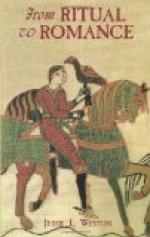Again, in the fragmentary remains of Thomas’s Tristan we have a passage in which the poet refers, as source, to a certain Bréri, who knew “all the feats, and all the tales, of all the kings, and all the counts who had lived in Britain."[8]
Finally, Giraldus Cambrensis refers to famosus ille fabulator, Bledhericus, who had lived “shortly before our time” and whose renown he evidently takes for granted was familiar to his readers.
Now are we to hold that the Bleheris who, according to Wauchier, had told tales concerning Gawain, and Arthur’s court, one of whic tales was certainly the Grail adventure; the Master Blihis, who knew the Grail mystery, and gave solemn warning against its revelation; the Blihos-Bliheris, who knew the Grail, and many other tales; the Bréri, who knew all the legendary tales concerning the princes of Britain; and the famous story-teller Bledhericus, of whom Giraldus speaks, are distinct and separate personages, or mere inventions of the separate writers, or do all these passages refer to one and the same individual, who, in that case, may well have deserved the title famosus ille fabulator?
With regard to the attitude taken up by certain critics, that no evidential value can be attached to these references, I would point out that when Medieval writers quote an authority for their statements they, as a rule, refer to a writer whose name carries weight, and will impress their readers; they are offering a guarantee for the authenticity of their statements. The special attribution may be purely fictitious but the individual referred to enjoys an established reputation. Thus, the later cyclic redactions of the Arthurian romances are largely attributed to Walter Map, who, in view of his public position, and political activities, could certainly never have had the leisure to compose one half of the literature with which he is credited! In the same way Robert de Borron, Chrétien de Troyes, Wolfram von Eschenbach, are all referred to as sources without any justification in fact. Nor is it probable that Wauchier, who wrote on the continent, and who, if he be really Wauchier de Denain, was under the patronage of the Count of Flanders, would have gone out of his way to invent a Welsh source.
Judging from analogy, the actual existence of a personage named Bleheris, who enjoyed a remarkable reputation as a story-teller, is, prima facie, extremely probable.[9]
But are these references independent, was there more than one Bleheris? I think not. The name is a proper, and not a family, name. In the latter case it might be possible to argue that we were dealing with separate members of a family, or group, of bardic poets, whose office it was to preserve, and relate, the national legends. But we are dealing with variants of a proper name, and that of distinctly insular, and Welsh origin.[10]




